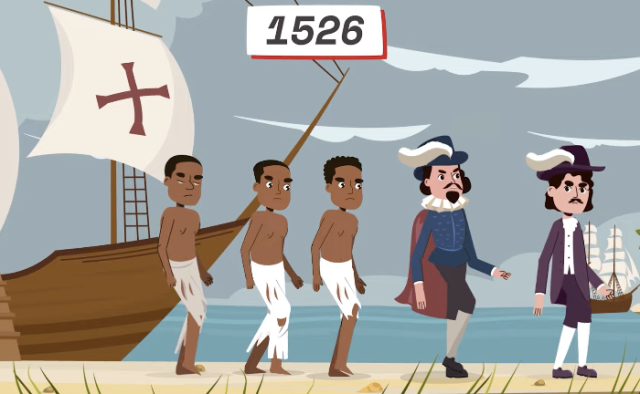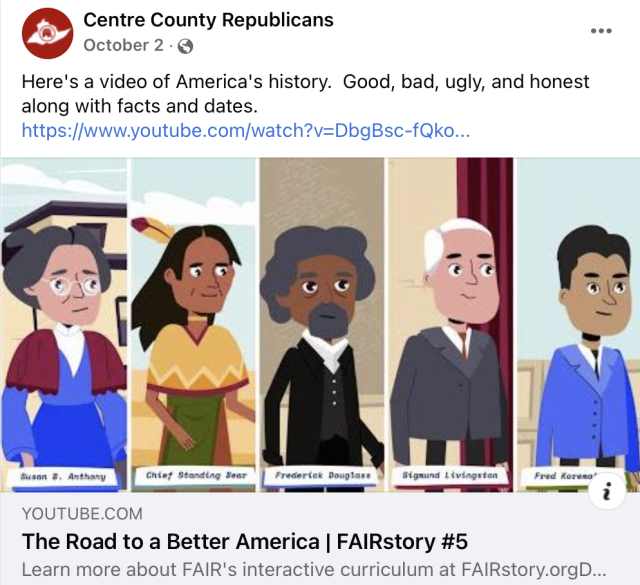
Views from the Commons
Posts Filtered by Month - December 2021 |
Show Recent Posts
December 30, 2021
FAIRstory 2: Mistakes Were Made
by Hal Wright
FAIRstory 2: Mistakes Were Made
by Hal Wright
Are stories about atrocities committed during the European conquest of North America more palatable to white, right-leaning Americans when the atrocities are described in the passive voice? FAIRstory's authors seem to think so.
FAIRstory has emerged as an alternative to current diversity, equity and inclusion (DEI) initiatives, with the goal of “advancing civil rights and liberties for all Americans." Its founder, musician Daryl Davis, has grown famous for persuading members of right-wing hate groups to examine and ultimately to discard their hateful beliefs. That's impressive and necessary work. The question we must ask though is whether a social studies curriculum founded on persuasion rather than on telling of the whole truth serves the educational goals of a public school.

A screenshot from FAIRStory Video #7
FAIRstory's default use of the passive voice to describe atrocities in US history creates issues of improper framing. People of color “were previously denied rights.” Native Americans “were not even considered people.” Japanese Americans “were forced into internment camps.” Things in the South "got much worse." And so on.
To illustrate the problem, let's rewrite just a little of this narrative in the active voice.
"Eager to gain control of and to make profitable new territories rich in natural resources, many colonists embraced a brand of racism in which people of color were unworthy of the human rights the colonists established for themselves. Over time, colonists and their enablers kidnapped and enslaved millions of Africans, while leaders in the nascent US government created legal pathways to permit chattel slavery and to expand farmland available to enslavers through the slaughter and forced relocation of native populations."
In naming the depravity without describing the mechanisms by which the perpetrators got away with it, FAIRstory obscures the extent which enslavers embedded racism into the political and economic systems of the United States. That remnants of systemic racism survive in our institutions to the present day is an inconvenient truth the authors of FAIRstory prefer to downplay.
In video #5, we encounter what is perhaps FAIRstory's most problematic framing: its statement that the US "was born with slavery and abolitionism." The "-ism" in "abolitionism" is verbal sleight of hand worthy of a Philadelphia lawyer. The United States was born with slavery, full stop. Some folks objected and wrote about it, and over time some states took actions to ban or to limit slavery within their borders. In the run-up to the Civil War, compromises were made to ensure that slavery would thrive in the South. FAIRstory presses the narrative that states' rights have proven helpful in our journey toward freedom for all. An equally valid narrative barely acknowledged by FAIRstory is that rich and powerful southerners who identified as white exploited states' rights to preserve and to intensify brutality against enslaved people for generations, and to extinguish the lives and liberty of freed African-Americans thereafter.
Further on in video #5, the passive voice gives way to micro-biographies of abolitionists and civil rights leaders throughout our history written in the active voice. FAIRstory describes fantasy scenarios in which a few persuasive individuals, emboldened by an irrepressible sense of fairness, singlehandedly bent the arc of history. In reality, of course, our journey away from slavery and discrimination has been uneven, messy, driven by a variety of social and emotional forces, and accompanied by episodes of mass activism which descended into violence. Words have always been just one step (and too often the only step) taken by the eloquent among us.
And about the words of those historical figures FAIRstory highlights in video #5? They were cherry-picked to create the false notion that the seeds of abolition have grown throughout time from no other fertilizer but an enlightened sense of the oneness of the human race. Nowhere to be found, for example, is Lincoln's ambivalence on race: his low opinion of the intelligence of enslaved Black Americans and his desire to see all of them depart the continent. Nor do we find King's admonitions about the trajectory of capitalism in America which became one focus of his activism shortly before his death.
History is the whole story of who did what with whom, for whom, to whom — and why they did it. in contrast, FAIRstory is a purpose-built attempt to heal our fractured nation by amplifying selected parts of its history while disguising others. It's interesting material and I do not regret the time I spent with it. But it's not a worthy history lesson, any more than the white-washed public school curricula of the past. Learning to live with hard truths without taking your bad feelings out on the messenger or on the victims is a necessary skill too few of us have been compelled to master.
This article has been edited for clarity.

December 28, 2021
Infrastructure Is a Bridge to Progress for All
by Steve Cickay
Infrastructure Is a Bridge to Progress for All
by Steve Cickay
In an age where political dysfunction is so rampant that obstruction and doing nothing is so often the rule, it was a pleasure to see in my own backyard something new and wonderful created that pleased everyone: the Scudder Falls shared-use path. I dream for more such creations in the future.
Recently, I took a walk across the new Scudder Falls shared-use path and saw smiles on every walker, runner and bicyclist I passed. I saw new views of our beautiful Delaware River as I lingered on the bridge, admiring both the engineering accomplishment and the surrounding natural beauty. In a few days I was on the bridge again and saw even more smiles.A vie

I am sure though that after a while, the novelty will wear off and people will consider this once new path as part of the expected landscape and grow to assume that, of course, it was always here and unimaginable that once we were without it.
But reflecting on America’s past, we see that what has made our country great were people of vision who did not simply see the way things are, but had the courage and wisdom to dream visions of what could be.
Once America had no transcontinental railroads, no interstate highways, and no airports. But wise Americans of all political parties saw a vision of how an America could be built so that it could be better for all. And so bridges were built to these new things which people soon could not conceive that they once did not exist.
Once America had no funded kindergarten through 12th grade education for children, no laws preventing young children from working in factories, no such thing as a weekend or a 40 hour work week, and only poverty and illness awaiting most of the elderly in their “golden years.” But wise Americans saw a vision of how an America could be built so that all children would be guaranteed an education, workers had the leisure of a weekend and evening, and the elderly had a healthy and secure retirement. The bridges of universal grade-school education, the 40 hour work week, Social Security and Medicare were built and people soon could not conceive that they once did not exist
Before us now are more visions of how to build back an America that will be better for all. There are plans proposed for even more education for our young children via universal pre-K, plans to lift millions of children out of poverty through the child tax credit, plans to help hard-working families with childcare and eldercare costs, plans to make medicine and healthcare more affordable for all, and plans to support energy systems that will help preserve our life-sustaining planet.
There are again those who wish to keep things the way they are and fail to see how much better America would be if we invest in building those bridges to a better future for all. But I hope that those who dream will prevail, as they have in the past, so that all Americans will one day soon find it inconceivable that these bridges once did not exist.
On my second walk across the bridge I saw a family of four bicycling, each with smiles on their faces. The parents were happy to see their children experiencing what a few days before had never existed. They saw them riding across that bridge to a happier, better future thanks to the wisdom of leaders who dreamed for a better America and did not simply and foolishly say no.
Please. Take that ride across that beautiful bridge, together, with all your fellow-Americans, to a better future for all.

The Delaware River, facing North, viewed from the Scudder Falls shared-use path

December 22, 2021
George Will Doesn't Like the 1619 Project
by Hal Wright
George Will Doesn't Like the 1619 Project
by Hal Wright
Right-wing panic around the ground-breaking project from the New York Times is peaking throughout the country. George Will just poured his ration of gasoline on the fire.
In a tantrum spanning the first two-thirds of his op-ed, Will excoriates the 1619 Project host Nikole Hannah-Jones for her statement that the Revolutionary War was fought in large part to preserve slavery in North America. On the basis of this mildly hyperbolic statement, which Hannah-Jones has since walked back, Will brands the entirety of the 1619 Project as "historically illiterate."
It would not be productive to parse Will's words here. If Will knows much about the 1619 Project beyond what historian Gordon Wood has written about it, he provides no evidence to that effect in his op-ed. Nor is there evidence that Will read the article cited in his op-ed which takes Wood to task for ignoring Black Americans and American slavery almost entirely.
Instead, let's consider what makes the 1619 Project so inflammatory to right-wing pundits and politicians. The 1619 Project chronicles in gruesome detail how enslaved Americans and their progeny have experienced the country in which they live. It celebrates the patriotism of Black Americans who, in fighting for their own liberty, have expanded liberty for all of us. It posits persuasively that Black art and music are the engine of American culture. In pointing fingers, and it does point fingers, the 1619 Project presents actual atrocities as evidence of broad-based intent to harm.
Now let's look at facts which no honest observer would dispute. For 240 years, enslavers crafted chattel slavery into an ever more efficient system of degradation and torture for their own gain. In the 100 years after the Civil War, every attempt by Black Americans to engage in citizenship from a position of equality was met with violent, deadly resistance. The years since the civil rights legislation of the 1960's have been better but far from ideal. And vestiges of the bad old days are embedded in our public policy, in our institutions, and in our economy.
Right-wing Americans have pushed back against every freedom movement in our history, sowing fear and resentment with the same reactionary tropes around hidden political agendas and communism. It's predictable that George Will would join the chorus. His breathless appeals to somewhere south of the cerebral cortex notwithstanding, Will is wrong when he says the transformation Hannah-Jones seeks would destroy us. Like similar transformations of the past, purging systemic racism would improve our country, bringing us closer to the aspirations laid out in our founding documents.
All good history lessons have flaws. The 1619 Project was written by smart, conscientious, imperfect humans. It tells the truth the great majority of the time, and at its best it hits like a punch to the gut. We cannot blame a descendant of enslaved Black Americans when she centers in her work the systemic brutality people who look like her have endured, and names the evil actors. We can admire the persistence of abolitionists and quibble about details of fact while remaining grateful for the opportunity to learn Hannah-Jones's perspective provides.
This article has been edited for clarity.

December 15, 2021
DEI Programs: Necessary Intervention, Not Indoctrination
By Hal Wright
DEI Programs: Necessary Intervention, Not Indoctrination
By Hal Wright
Bucks NAACP President Karen Downer hopes diversity, equity, and inclusion (DEI) programs will make a comeback in 2022. I hope so too.
In her pitch-perfect opinion piece, Downer highlights the need for DEI programs by listing just some of the indignities happening right now in Bucks County schools:
- Asian American Pacific Islander students being blamed for COVID-19
- Rampant use of racial slurs against Black people, including against an elementary school student who was called "slave" and "gang member"
- Latino/a students being told to “go back to their country”
- Muslim students being called terrorists
- White students making racial and ethnic slurs on social media
- Harassment of LGBTQ students both in school and on social media
Students who feel unsafe in school have difficulty learning and experience mental health issues at higher rates. A well-crafted DEI program isn't an ideological indoctrination. It's a direct and practical effort to help all students feel comfortable and welcomed in schools they are required by law to attend.

December 13, 2021
The New Age of the Robber Barons
by Steve Cickay
The New Age of the Robber Barons
by Steve Cickay
While the ultrarich amuse themselves with rides into space, millions lack the basic necessities of life.
Jeff Bezos and Richard Branson spend millions developing space tourism for the rich, blasting themselves and rich customers into brief joyrides into space. This wasteful extravagance is yet another reminder that income inequality has reached new heights of obscenity. And the media covers this ostentatious vulgarity with such starry-eyed sycophancy.
Millions of people on Earth lack the basics of food, housing and medical care. We race blindly to our species' extinction due to human-induced climate change. We are in the middle of a pandemic that has killed millions of people and billions are still unvaccinated.
Here in the United States, millions who could be vaccinated for free refuse to do so in great part due to the Republican Party’s self-serving politicization and anti-science ideology. And here in Pennsylvania we shamelessly have had a poverty minimum wage of $7.25 an hour for over 10 years.
What does this say about us as a society and its moral focus?
The billionaires’ focus is rather on spending their mountains of cash to give rich people more jollies. And the mega-corporations continue to not even pay any federal taxes. Thank goodness President Biden is trying to make the rich pay their fair share, but of course he has to fight the Republicans tooth and nail for this no-brainer.
So, enjoy the television visions of rich people having fun in space while you workers, without billions of dollars, contend with trying to afford health care, child care, and pre-K and college education for your children and will soon be struggling to survive from the adverse, often deadly, effects of climate change.
President Biden is also fighting to help you on these issues with his Build Back Better program, but of course he has to fight the Republicans for this as well.
Billionaires have a ticket to ride on the backs of their workers, who have no hope of getting off the ground without activism and reform.
Steve Cickay is a resident of Newtown. A version of this article was published in the Bucks County Courier Times.

December 11, 2021
FAIRstory 1: Worms Eating at the Rind
by Hal Wright
FAIRstory 1: Worms Eating at the Rind
by Hal Wright
FAIRstory has emerged as one alternative to current diversity, equity and inclusion programs. It's purpose-built to appeal to the "anti-CRT" crowd, and does not belong in any public school.
I first became aware of FAIRstory in a post to the Centre County Republicans Facebook page. In the aftermath of last year's election, the Centre County Republican Committee promoted the Big Lie. After January 6th, they tried to inoculate themselves from blame by denouncing the violence. Trying to have it both ways is how they roll in a county with a blue middle surrounded by deep red.
So it's no surprise that they've embraced the FAIRstory approach. FAIRstory would like us to agree with the CCRC that they deal honestly with the good, the bad and the ugly of America's racist past. Let's take a closer look, though, to see what worms are eating at the rind. Fortunately, FAIRstory provides us with a roadmap to do so.

To sell a curriculum about slavery to right-leaning Americans in 2021, it's not good enough to simply deliver the materials. You have to try to own the libs. FAIRstory builds its "anti-CRT" cred in a critique of the Standards for Justice, a bellwether curriculum written by the Southern Poverty Law Center’s Learning for Justice project.
As academics, the authors of FAIRstory cannot impugn CRT like Republican politicians do, using the phrase as an umbrella for everything they don't like. Instead, they make the unsubstantiated claim that CRT "in recent months" has morphed into a "rejection of all systems implicated, however tangentially, with racist practices." The problem, you see, is not cynical right-wing politicians turning CRT into in a meaningless, inflammatory buzzword. The problem is liberals tearing down our institutions and culture. Right.
From this ideological perch, FAIRstory parses an "About" document authored by Teaching Tolerance (the precursor to Learning for Justice) word-for-word in search of things right wing politicians want them to find. Some of FAIRstory's bizarre claims:
- SPLC's use of the phrase "raising consciousness" has Marxist implications.
- SPLC's use of the word "democracy" without the modifier "American" in front reveals an anti-American bias.
- SPLC's use of the word "equitable" might link to radical CRT because “‘equitable’ can mean equality of outcomes."
In general, FAIRstory concern-trolls any mention of a person’s group identity and lived experience. Of course, systemic racism is oppression based on groups, groups often defined by the oppressor for their own benefit and with members who would rather not belong. An antiracist movement which isn't group-centric – which does not address how group identities intersect to influence a person's experience of their government and culture – is effectively defanged.
Right-wing politicians will recognize FAIRstory's tactics because they use them all the time. Political movements to expand human rights in the United States have always been collective in nature. To push back: Sever a person's connection to others similarly affected by bigotry, discrimination and hate with appeals to individuality. Delegitimize groups combatting racism by calling them Marxist, anti-American, and violent.
Of course, it goes without saying that the right has no intention of abandoning its collectives, and no intention of admitting into them any person who isn’t in lock step with their vision for our country.
The shame is, FAIRstory could have created a program emphasizing individual character to stand helpfully alongside such programs as Learning for Justice and The 1619 Project. But in its current form and with its implicit agenda, FAIRstory doesn’t belong in any US public school.
Future articles in this series will examine the FAIRstory approach in greater detail.
This article has been edited for clarity.

POSTS BY TYPE
POSTS BY TAG
POSTS BY MONTH